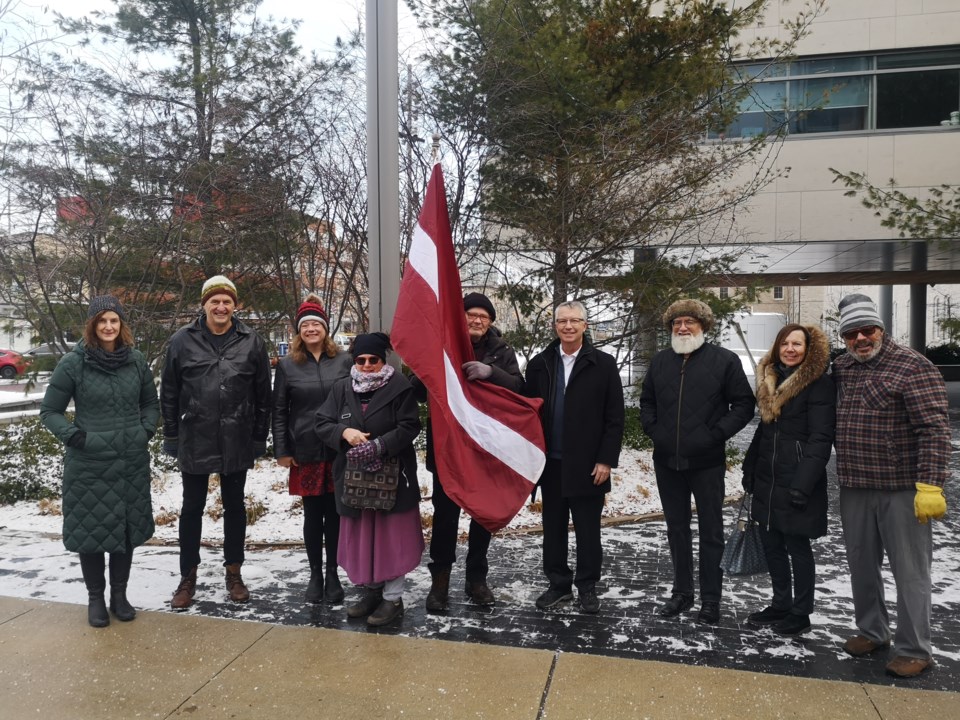For the first time, the City of Guelph is joining municipalities across Canada in flying the Latvian flag to honour of Latvian Independence Day on Friday.
Latvia’s history is long and complex, much of it tainted by occupation.
Russia first began occupying the small Baltic country in the early 18th century. Latvia declared independence on Nov. 18, 1918, though they didn’t gain freedom from Russia until 1920 after a two-year war.
But they again became occupied by Russia during World War Two, and didn’t regain independence until 1990.
“It took a long time for people to even smile,” said Rita Ricciatti, who was at the ceremony.
“Growing up, it was always a very important day to commemorate the freedom of the people, because when they had their freedom, Latvia blossomed,” she said. “And then World War Two comes along, and everything got depressing.”
For her, the day commemorates what her parents have been through, and is a time to show solidarity for Ukraine.
“When I was a kid, nothing happened (for Independence Day) in Guelph,” said Pauls Miniats, who was also at the ceremony. Miniats holds dual citizenship, and though he was born in Canada, lived in Latvia during and after the revolution from 1989 to 1997.
He said it was an emotional time in Latvia after the revolution, when Latvia gained freedom yet again. But he said Friday, for him, was even more powerful.
“We were a small number at city hall, but because of my personal attachment to my family, it was probably the most touched I’ve ever felt,” he said.
His mother, Elma Miniats, was born in 1926, and “suffered through the war. It changed her life,” he said.
“She lived and worked in Guelph, and worked so hard to try to promote the injustices that had been done to her and to men and women from that country,” Miniats said. “And the fact that her flag was raised in Guelph today for the first time, I know she’s looking down, she’s happy.”
Arnis Mikelsons, who is the Guelph representative for the Latvian National Federation in Canada, and was responsible for the ceremony taking place, along with his wife, city councillor Leanne Caron.
“I think it's particularly important to be thinking about independence with what's going on in Ukraine. You can’t take independence lightly; you have to keep that fire going,” he said in an interview. “While the number of Latvians in Guelph may be small, we are united around the world with our brothers and sisters."
Mikelsons own family left Latvia during World War Two – his father for Canada and his uncle for the U.S., neither ever seeing their parents again, nor the brother who remained in Latvia and was later deported to Siberia.
“We watch in horror and disbelief as Russia continues its pursuit of taking over Ukraine,” Mikelsons wrote in a blog post reflecting on Russia’s occupation of Latvia. “I look at that and see the difficult choices that our families had to make in the 1940s. Do we leave as refugees, and look for the generosity of other countries, or do we stay and fight?”
As a result of those decisions, he said families were broken up, never to see each other again.
“Ukrainian families are facing the same choices today. We hope that the full independence of Ukraine will come sooner rather than later. We cannot let brute force win.”
“The Ukrainians will get their land back,” he wrote.”It took Latvians until the 1990s to regain their freedom. They never gave up hope and kept their culture alive and resisted in ways that were available to them despite Russian occupation.”
The Latvian flag will fly at city hall for a week, after which the Ukrainian flag will go back up.
